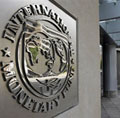| NSPM in English | |||
Decision in Greece: Crisis in the European Union |
 |
 |
 |
| среда, 05. мај 2010. | |
|
(Strategic Culture Foundation, 5.5.2010)
Merkel opposed, Brown was against, Sarkozy posed as helping guy and Berlusconi simulated solidarity. How it came that the leading figures of EU gave way to the IMF to play a main role in managing the Greek crisis, the archives may tell in some decades. Then it could also become obvious that the 25th of March 2010 was the beginning of the end of the “Euro”. On this very day the German chancellor Angela Merkel declared that EU and IMF agreed upon a financial shield to secure the miserable Greek situation. This guarantee, she assured the public, will not lead to a real payment. Its only function lies in preventing the financial markets to speculate “а la baisse”. The speculators were not impressed. On the contrary: as soon as they came to know, IMF and EU would save Greece anyhow they started to subscribe for Greek government bonds. Lending money in the European Central Bank (ECB) for 1% of interest-rate and subscribing state-bonds for 6% was a save investment. End of March Greece had emitted bonds for 18 billion Euro. The 6% interest-rate doubled German bonds at the time, a perfect bargain for speculators. End of April the rating-agency “Standard & Poor’s” classified Greek bonds as “junk”, now speculators only were willing to give money to Athens for 18% and more. The IMF-EU-“stability package” of 110 billions of Euros plans to save the currency and thereby the profits of the financial markets. Why Greece? Looking through the statistics – for example of the Viennese Institute for Comparative Studies – one can easily find that Greece does not stand alone. It is true: Athens’ performance is miserable. Its deficit amounted to 13,6% of GDP (whereas Maastricht stability-criteria allow only 3%) and its debt reached a maximum height of 115% of GPD (allowed are 60%). But being honest one has to accept the whole truth: at the moment there are only two countries in the European Union fulfilling the Maastricht-criteria: Bulgaria and Estonia. By the way: both are ruled by “currency boards” and thereby under the control of IMF and World Bank. Greece is not even the worst case. In terms of deficit Ireland (with 15%) and United Kingdom (with 13%) have similar figures, and speaking of debt, Italy (with 118%) reaches the Greek level. So why Greece? There are special and diverse internal and external factors. As specially Greek we have to name three of them: demographic “shaking-out” of agrarian population, high percentage of civil servants and catastrophic investments for the Olympic Games of 2004. All are somehow linked with European and global phenomena. After the accession of Greece to the European Community in 1981 the sudden lack of protection for national and local products led to a rapid change in demography. The agrarian sector was hit most. Out of 21% of agrarian population in 1981 only 6% survived till today. All the others were forced to flee the countryside. Parallel to this movement Athens became a monstrous mega-polis, where today 5 out of 11 million Greek try to survive. To avoid high joblessness and social unrest the governments at the time offered lots of jobs in the civil service sector, which was an expensive way of providing social peace. Today economists estimate a figure of 25% of Greek families, where at least one member earns his living in the state or communal sector. The most visible, purely external factor influencing the Greek economic show-down lies in the perfectly linked community of rating-agencies and speculating banks, backed by supranational politicians within the European Union. It is somehow there businesses to accumulate capital wherever it is possible and where it promises most profit. To achieve this goal with few or no democratic control, the structure of the Brussels’ Union is helpful. The European Commission as its executive body is not elected by the sovereign, the people, but appointed by the heads of the national governments, who themselves are executive bodies. This lack of responsibility towards the people is filled by strong business-lobbies. No wonder that the outcome of the stability pact with Greece is stabilizing the interests of the banks lending capital and not the social structure of the country. “America stands behind the attacks on the Greek economy that led to the disastrous situation”, states the well-known Greek sociologist Vassilis Filias, Emeritus from the Pandion-University and actually teaching officers in the “Institute for National Defence”. “Greece is going to be punished for its bad geopolitical behaviour in the eyes of Washington”, Filias continues. Answering the question, for what it had to be sanctioned in that way, he names three causes: “Makedonia, Kosovo and the contract for the pipeline between Burgas and Alexandropolis.” In all three matters the Greek government acted against US-interests. The blockade of the Makedonian naming hinders Skopje till today to obtain NATO-membership (and to start with serious EU-talks). The politics towards the US-aggression against Yugoslavia in 1999 led to the rejection of recognizing Kosovo as a state. And the treaty with Russia on the pipeline Burgas-Alexandropolis stands in opposition to the planned influence of Turkey and Georgia as transit-countries for supplying Europe with energy. Left-wing intellectuals like Filias are convinced, that the new stability-package for Athens also has the function to discipline the country in geopolitical terms. “The conservative government of Karamanlis would have negotiated also with Moscow, specially after foreign minister Sergey Lavrov had stated that Russia stands on the side of Greece”, he said. European Union and United States follow their own, quite different interests. First of all, Brussels is concerned about the “Euro”-zone. Its breakdown is possible and even foreseeable, not so much because of Greece but because of the bad economic situation in the whole EU. Beside this, the now credited package of 110 billion Euros for Greece shall guarantee the continuation of military expenses. Papandreou’s trip to Berlin to ask for money at the same time was a shopping-trip in the name of what is called “military diplomacy”. New ordered submarines from Thyssen and “Eurofighters” from EADS have to be paid in the near future. On the other side Washington is using the actual weakness of Athens to get more of its own airplanes and ships in the Aegean Sea. Under the banner of “de-militarization”, Greece shall be forced to give-up its special national claim to control coasts in the East of the Aegean Sea, instead the US-guided NATO is planning to get the exclusive rights for the military air-space and sea-space in the region and thereby the total control over the Dardanelles. Is also therefore that Greece shall be “saved”. Who pays for it? Who is shouldering the risk for the 110 billion Euros, IMF and EU-countries are crediting to Athens, to be paid back? First and utmost, it will be the ordinary people of Greece. The planned measures are full of social cruelties. Under the criteria of what IMF understands under “stability”, the Greek government is decreeing anti-social measures and thereby risking heavy social unrest. Mass-taxation for consuming goods, which are responsible already for two thirds of the budgetary income, shall be raised. VAT-tax is going up to 23% respectively 25% after it already was raised from 19% to 21% in March 2010. Taxes on tobacco and alcohol will be raised by 10%. The income of civil servants will be reduced by at least 15% at once, cutting 2 out of 14 monthly incomes. Other measures like freezing income for at least 3 years and allowing pension only after 67 complete a package, which can be seen as a social attack. Its second risk lies in the general downturn of demand. Cutting wages and income necessarily lead to shrinking demand in the consuming sector. Heavy setbacks in trade and tourism are likely. Giorgos Sofronas, vice-chair of the Athens’ chamber of trade criticized already the first stability package: “We are going from bad to worse”, he stated in the weekly magazine “Athensplus” on the 9th of April 2010. The National Confederation of Greek Commerce (ESEE) reported in the same paper a drop in turnover of 15% to 20%. This was already before the new crude measures were made public. Tourism is in a state of shock. This branch is responsible for 18% of the Greek GDP. Its crisis is frightening. During Easter time, which is normally a high season for Greece, the booking was 50% to 70% behind last year’s average. Hotels and holiday resorts are seeking new owners. Real estates for tourist purpose for some 5 billion Euros are pushing on the market, and destroying the prices. Contrarily to the promised saying of IMF-Kahn and EU-Merkel, economic stability is far away; not to speak of social stability. It turns out that the whole package tied up by Washington and Brussels serves for different things: for paying back the interest rates for state-bonds as long as possible to mostly French, some German and other banks; for paying ordered German and French military utilities; and to enlarge the geopolitical sphere of interest for US-guided NATO. Hannes Hofbauer (Austria) |
Остали чланци у рубрици
- Playing With Fire in Ukraine
- Kosovo as a res extra commercium and the alchemy of colonization
- The Balkans XX years after NATO aggression: the case of the Republic of Srpska – past, present and future
- Из архиве - Remarks Before the Foreign Affairs Committee of the European Parliament
- Dysfunction in the Balkans - Can the Post-Yugoslav Settlement Survive?
- Serbia’s latest would-be savior is a modernizer, a strongman - or both
- Why the Ukraine Crisis Is the West’s Fault
- The Ghosts of World War I Circle over Ukraine
- Nato's action plan in Ukraine is right out of Dr Strangelove
- Why Yanukovych Said No to Europe

.jpg)








 The greek term “crisis” means decision or turning-point. And indeed we actually face a turning-point in European politics after World War II. One state within the European Union declared itself unable to pay its debt. On the 27th of April 2010, the Greek Prime Minister, Giorgos Papandreou, told the media that his government cannot borrow any more money on the capital market. The day before, short-term interest-rates for Greek government bonds exceeded long-term interest-rates, an infallible sign for facing bankruptcy. On the 1st of May Papandreou celebrated the stability package of the EU and IMF providing the country with fresh money of some 110 billion Euros as a victory for stability. He is wrong.
The greek term “crisis” means decision or turning-point. And indeed we actually face a turning-point in European politics after World War II. One state within the European Union declared itself unable to pay its debt. On the 27th of April 2010, the Greek Prime Minister, Giorgos Papandreou, told the media that his government cannot borrow any more money on the capital market. The day before, short-term interest-rates for Greek government bonds exceeded long-term interest-rates, an infallible sign for facing bankruptcy. On the 1st of May Papandreou celebrated the stability package of the EU and IMF providing the country with fresh money of some 110 billion Euros as a victory for stability. He is wrong.











